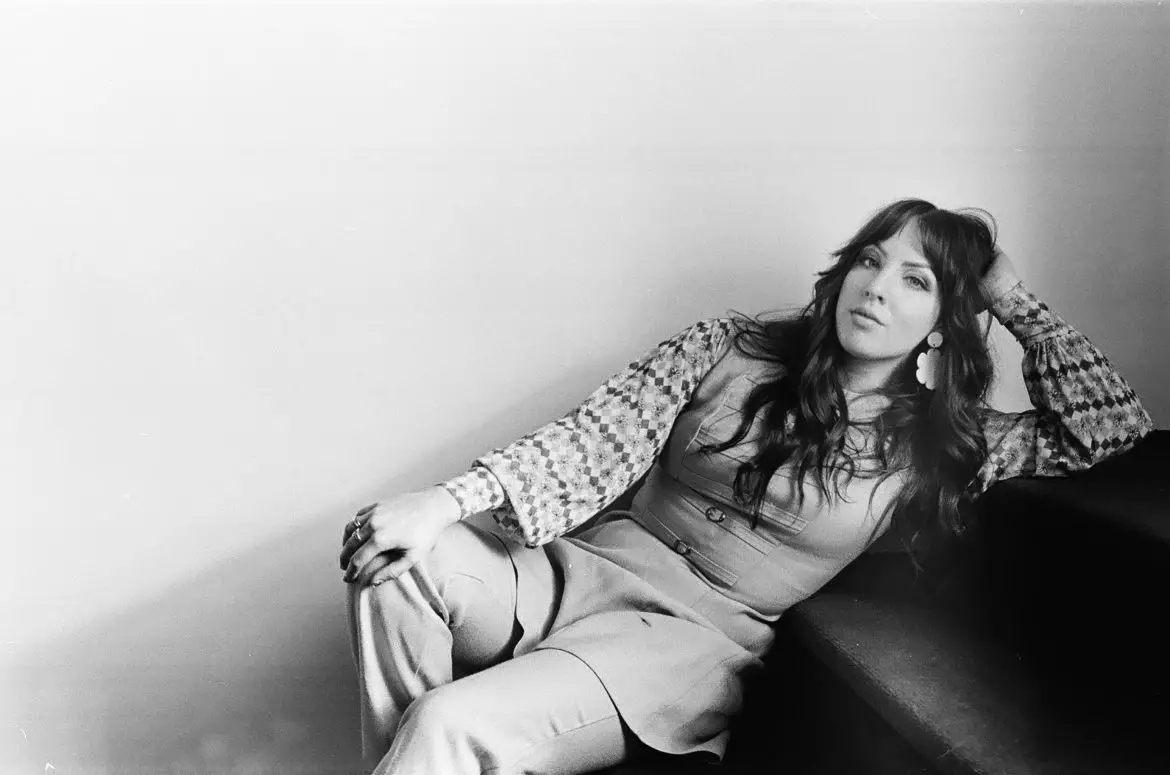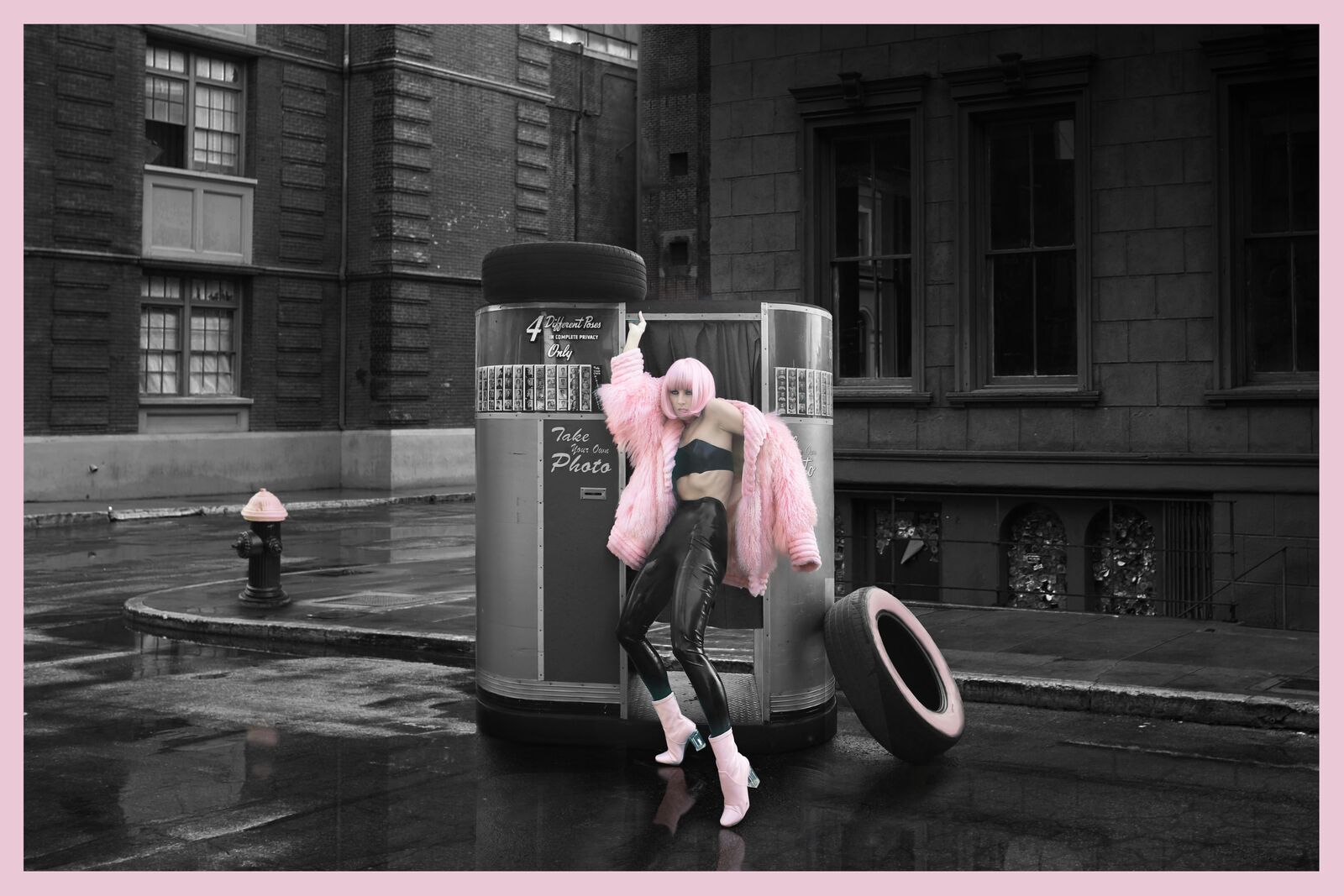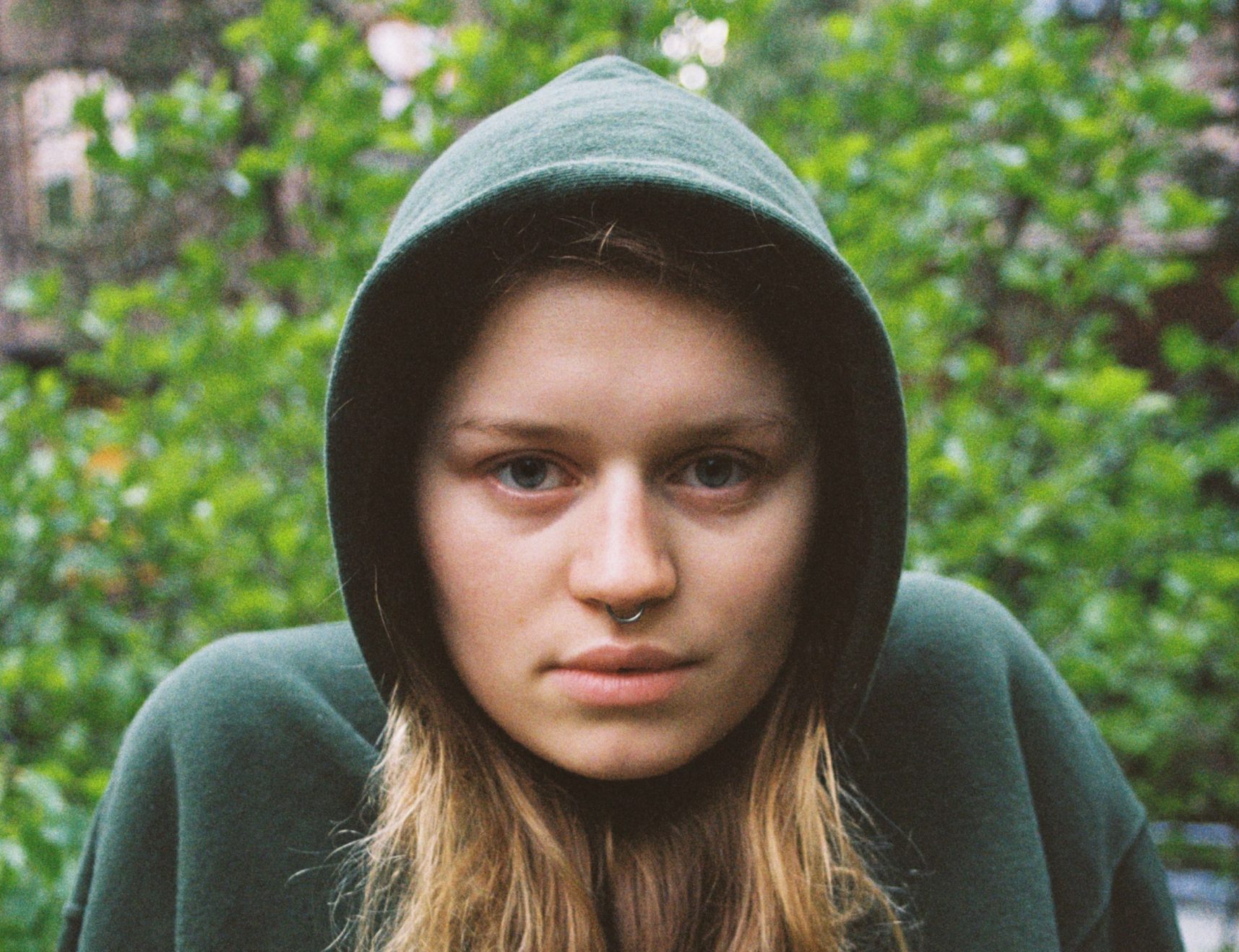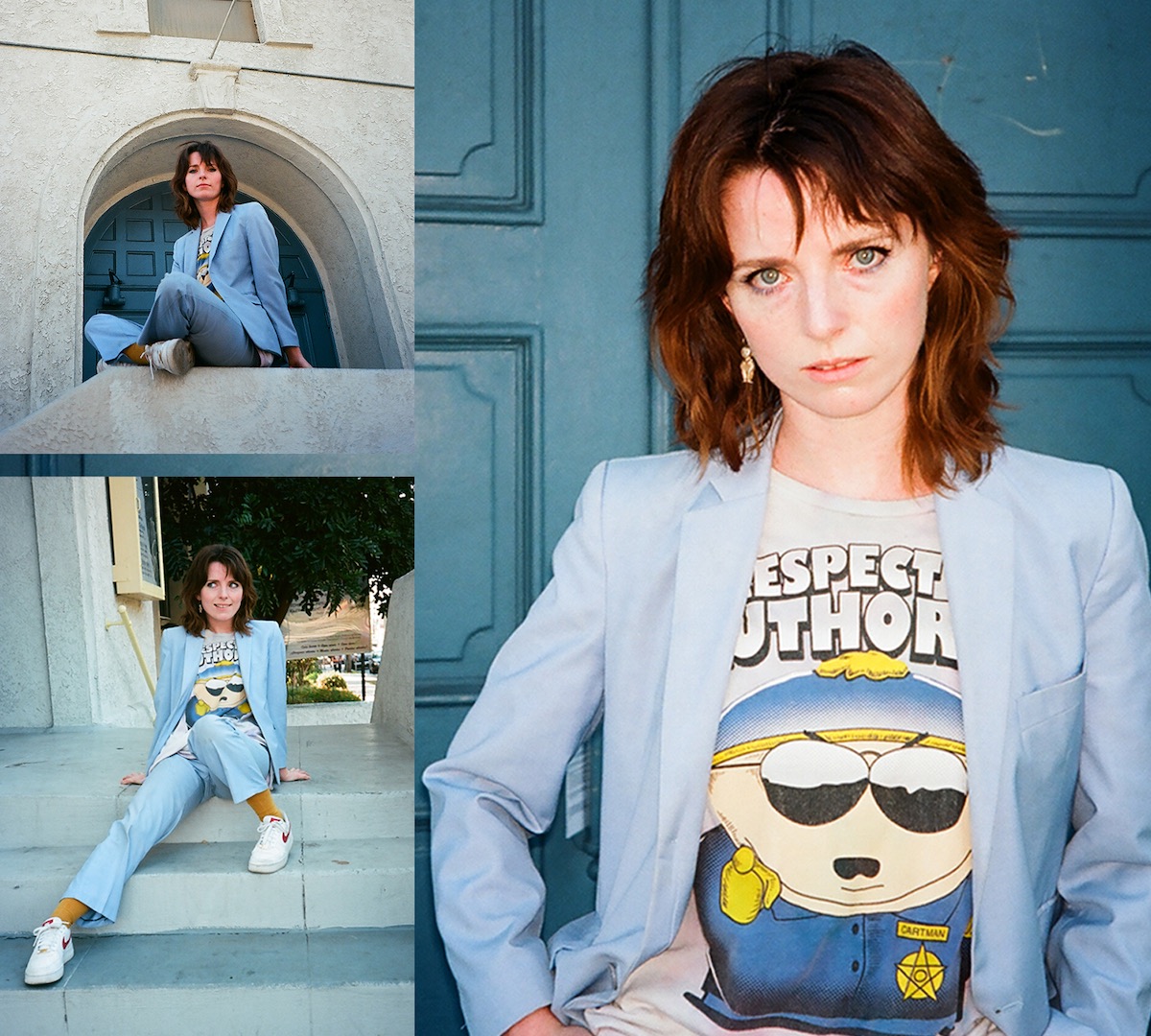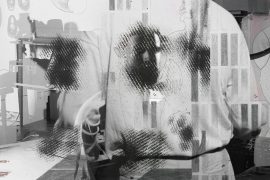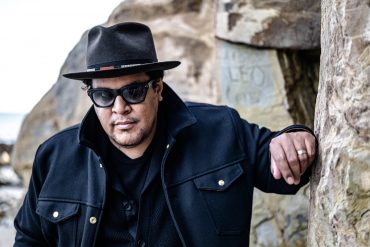Following the release of her solo album ‘Contentement,’ Acadian artist Julie Aubé talks about redefining recognizable sounds of the past with a francophone touch and the importance of expressing your true self.
Stream: ‘Contentement’ – Julie Aubé
I think what I’m trying to do now is make music in French that sounds more English, more American or British or whoever I’m inspired by. Because there is such less that has been done, especially in Acadie, it’s easy to add to it and make it.
There is something about the 1960s and ‘70s that evokes nostalgia for people regardless of if they lived through these eras or not. Perhaps it’s the sense of liberation and playfulness, the way that everything seems to have been fresh and revolutionary and charged by optimism. With technical innovations augmented, the ways of living became more relatable to those of today and this combined with the instantly recognizable aesthetics makes them a continuous reference point for inspiration.
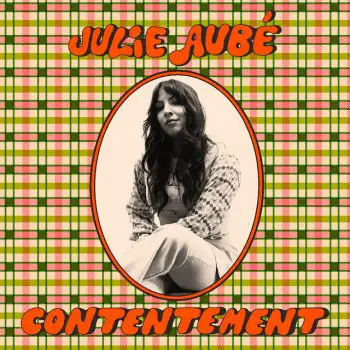
Contentement by Julie Aubé (released 9 September) is an album that fully embraces the sounds of ‘60s and ‘70s folk rock, doing so with a contagious sense of fun. Known as one of the three members of Les Hay Babies, a group from Moncton who play with the codes of these aforementioned eras, Contentement feels incredibly natural. The Acadian accent and dialect that’s at the heart of the songs give the music greater character so that it’s not just another stereotypical recreation of the past but a projection of personality.
The opening track “Watch-Toi” pulls the listener into the scene with the slick riffs and rawness of recording while “Au mitan de la vallée” furthers the introduction with a burst of energy and regional words (‘mitan’ meaning ‘milieu,’ ‘middle’).
Chaque jour devant ta fenêtre
C’est les Champs-Élysées
Un spectacle de silhouettes
La lune fait danser les marées
Chaque jour devant ton chevet
Même quand le temps est mauvais
Après la grêle et le gris
Le ciel étend sa tapisserie
As-tu la bonne volonté
As-tu la charité
Quelqu’un t’a-tu dit
Tu peux remplir ton panier de
Contentement
– “Contentement,” Julie Aubé
Well you’re living
Where it’s hip to be sad
Cool to be bad at everything
Never supposed to make money
That was supposed to be funny
Now you’re scraping by and getting old
Oh my, oh my, oh my
You’re my sad stranger, sad stranger
Think you need me to make your sad days better
Think I’m going to change the weather for you now
– “Sad Stranger,” Julie Aubé
“I just think I’m lucky person with my life, I get to make art. I truly am content and it’s hard for people to get to that place in their mind,” explains Julie Aubé in regard to how the motives behind the album arose during the pandemic period. This idea of finding positivity in situations is exemplified in songs such as the title track and “Changer le mal de place,” the latter an upbeat recount of important things disappearing from life and finding the means to move on, a rhythm rolling with twangs of guitar. Similarly, “Le temps des mûres” is an exclamation of appreciating the smaller things for example ‘le beau temps’, ‘le printemps’ et, bien sûr, ‘le mois d’août/ Quand c’est le temps de mûres’
Alongside the sonic landscape, Aubé’s dress sense also derives from the past. Her outfits aren’t those of trends that copy and paste retro looks but rather forgotten items unearthed from thrift store rails or flared trousers, jumpsuits, and crocheted granny square jackets all stitched with her own hands. “Deuxième main” is a song that emphasizes the charm of secondhand shopping, how Aubé is attracted to things left behind like shoes and backpacks, dolls, quilted blankets and pencils awaiting to be sharpened. She goes on to make the link between these items and people, the way that everyone (including the homeless neglected on the street) deserves a second change. A slower track, it fits alongside the “Like a Rolling Stone” style “Pas grande chose” (but with the lyrical regional touch of lines such as ‘T’es tannée du quotidien/ M’ressemble t’as toujours faim/ Pour de quoi de nouveau/ Anything goes’ and “Sad Stranger” which is the only English written track on the album.
Julie Aubé comes from New Brunswick, an officially bilingual province in Canada where the francophone pride is shared amongst tight communities or mixed into the evolved dialect of chiac, a melange of English and French unique to the south east of the province. Writing music in French that’s recognized across Canada and internationally (Aubé recently did a mini tour in the UK alongside British singer-songwriter Luke Jackson) puts spotlight on the Acadian culture that is often overshadowed. The artist spoke with Atwood Magazine about this, the importance of a sense of style, and celebrating happiness.
A CONVERSATION WITH JULIE AUBÉ
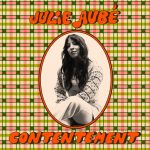
Atwood Magazine: How was your time in England? I saw on Instagram that you were there supporting a musician called Luke Jackson.
Julie Aubé: It was great! I loved it. It was my first time there.
How was it compared to your perceptions? I know you’re a big fan of The Beatles and past music from there so you must have had an image of the UK in your head since you were young. I wonder if it matched that or if there were things that surprised you!
Julie Aubé: Haha, I think the most surprising part was how much it reminded me of Canada! It made me realize which parts of Canadian culture, food, people, architecture come from being a dominion of the British empire.
Ohh interesting. How did that tour come about?
Julie Aubé: A long time ago, in 2019, I had a showcase at Le Congrès Mondial Acadien in Moncton. For some reason there was a booker or music industry person from England and he had this project in mind to do like a cultural exchange, have a tour in New Brunswick with a local artist and then do the same with somebody in the UK with a New Brunswick artist. They chose Luke and me to do it.
That’s a really fascinating concept to do like a cultural exchange with local artists.
Julie Aubé: I think it’s a really good way to get people discovered. It gives you an opportunity to play with new people and make connections. It’s cool because Luke and I were really well paired up musically and our age. Luke’s personality, age group, and what he does is so similar to mine that whoever would go see his show has the potential to really enjoy what I was playing as well.
What was the reception of your music like from the British crowd? I’m from England but I’m so accustomed to Francophone music, especially that from within Canada, so I wonder what those not familiar would have thought.
Julie Aubé: It’s hard to tell. I think they were still interested just because musically it sounds like, I don’t know, Joan Baez, or something they would have listened to our heard from the ‘60s and ‘70s. Because I’m bilingual, I could explain the songs and have a chit chat with people so that they could still get to know me. I think it still went really well.
Yeah your music feels so familiar regardless of language. When listening to Contentement for the first time there are some songs where I got instant Bob Dylan vibes. I also saw on Instagram that someone in a comment had described your music as a blend of Édith Piath and Bob Dylan but I would describe it as a blend of him and Édith Butler haha. When creating music do you think about the relation between classic English/ American music and the francophone stuff that’s perhaps closer to home?
Julie Aubé: Yeah I think what I’m trying to do now is make music in French that sounds more English, more American or British or whoever I’m inspired by. Because there is such less that has been done, especially in Acadie, it’s easy to add to it and make it.
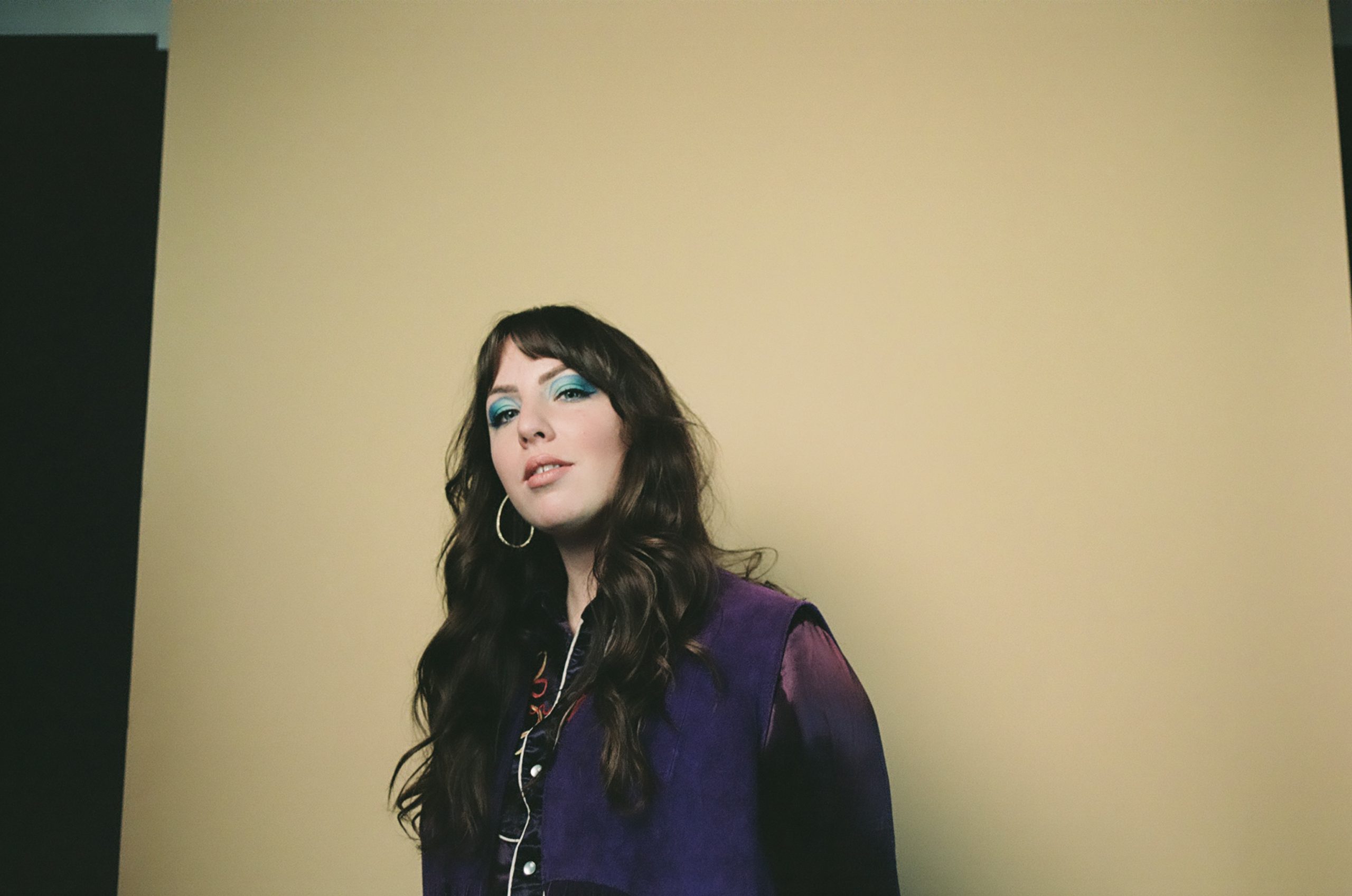
Yeah it’s like ‘60s and ‘70s music with an Acadian touch which feels powerful if you are somebody who wants to celebrate the francophone culture. What is the importance of writing songs in french for you?
Julie Aubé: Actually I talked about this a lot at my shows and I think that’s maybe what the English audience had found the most interesting. People maybe don’t realize that outside of Quebec there are still French speakers and they are their own separate culture. Growing up I wasn’t interested in it and I didn’t think it was cool or really understand it. When I went to school and spoke Acadian French, my teachers, who would have been from France or Quebec, didn’t understand so I would never be able to pass my French exam or they would be like “well why do you speak like that? Those verbs don’t exist anymore.” I think for me growing up I was just embarrassed because I didn’t understand why my french was ‘bad’ and I didn’t want to do music in French. Eventually I understood that it’s such a struggle to keep it alive and the fact that I still speak French in Acadie is kind of like a protest for preservation.
I find it crazy that your French teachers didn’t understand the traditional Acadian french. I would have thought they were local teachers who wanted to try and preserve the dialect with their students haha.
Julie Aubé: Yeah, especially in high school. It would be like you spend your whole life where everyone speaks the same and then suddenly I’m 16 and my teachers are like “wait you can’t say that. That’s not right, you can’t write that.” And all the kids were so confused because it’s like you are too old at that point to really change.
That’s interesting. This past year I’ve become more and more interested in the Acadian French and the communities there. I haven’t yet visited but hope to next year! I was wondering what the francophone communities are like in New Brunswick. Unfortunately I have the impression that these communities are pretty small.
Julie Aubé: Yeah, New Brunswick is where there is the most. 1/3 of the province is francophone. It’s still quite a bit and it’s usually mostly the rural parts. Sometimes you go to those places and everybody everywhere speaks French. I always find it so impressive that you can drive 20 minutes and get somewhere where everyone speaks French at every store then drive another 15 minutes and that will be a complete anglophone community and nobody there speaks French. That still exists in New Brunswick and in the whole Acadie and I think that in the Acadian parts, and in Moncton and Northern New Brunswick like Caraquet, the Acadians are really proud. There are really cool festivals, events and business owners and I find that it’s really dynamic for how small it is.
In terms of music, are there any places or things that are particularly significant for the promotion of the francophone music in New Brunswick?
Julie Aubé: Definitely Moncton. It’s become a place for young Acadians to move to in order to be more in the action like the same as it would be to move to Montreal for those reasons in Quebec. Moncton is kind of like the modern Acadie hub and the place where there’s the most stuff happening so it kind of has this iconic, legendary status to it if you’re an Acadian person and you’re young and growing up. It’s a place where you can go to party and meet people who are like you and maybe to learn more about what it means. For Les Hay Babies, we are all from different parts and we all ended up living there. We were 18 and immersing ourselves in the artistic community there was like going to college or university. We would go to every art show, every screening, every festival. We just met all the artists and got so into that scene.
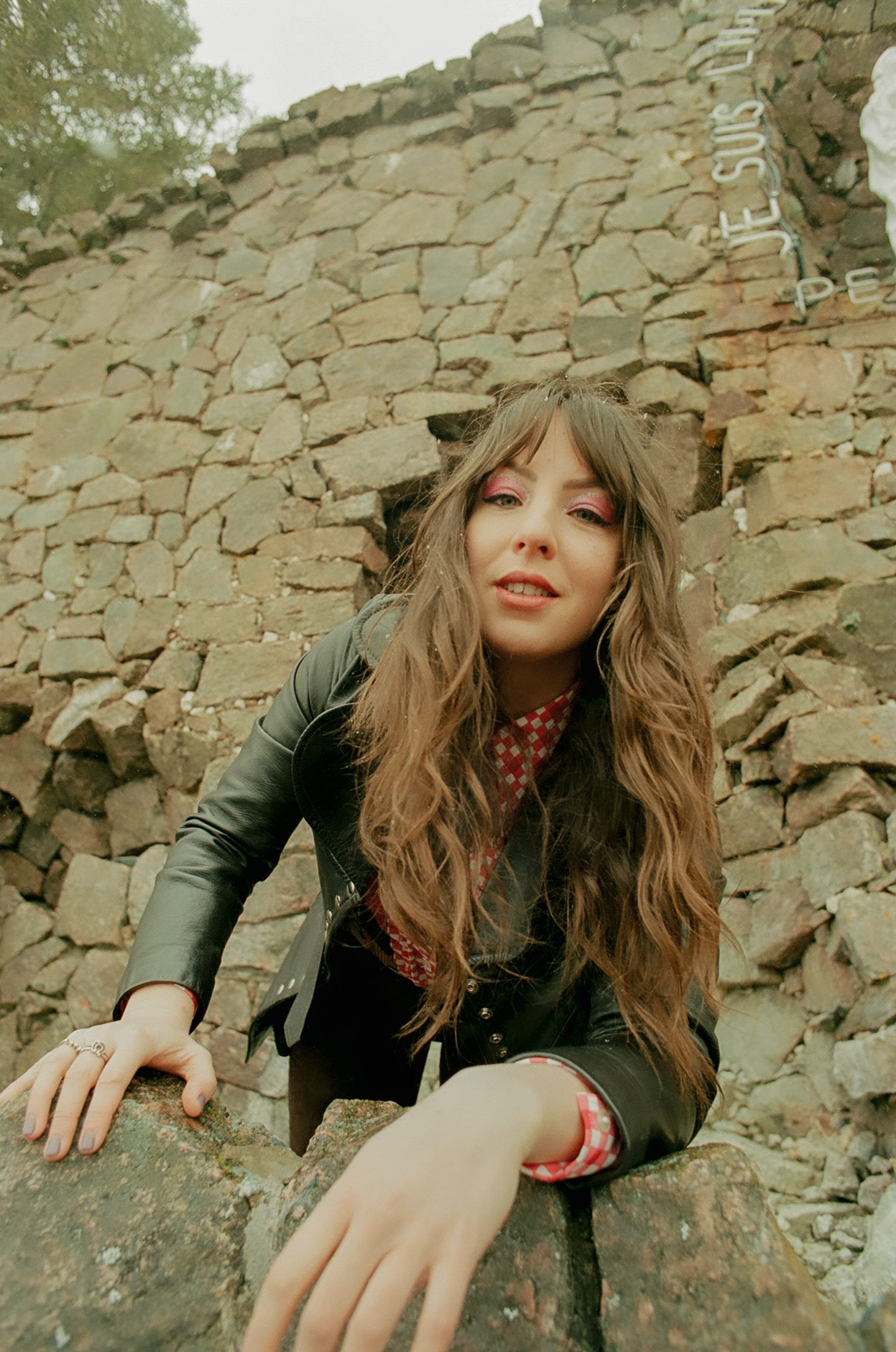
That’s great! Similarly, if wanting to visit this province are there are any specific cities or places that should be explored if wanting to immerse in the Acadian culture?
Julie Aubé: I would say that the center of all cool things is the Aberdeen Cultural Centre in downtown Moncton. It was an old school and now it’s a building with art galeries and artists studios. There’s a daycare, a really amazing restaurant, a venue. There’s always something cool happening there and the restaurant is one of the top 100 in Canada. So it’s a cool place to go for drinks or brunch. There’s also a cult bar that everyone needs to go to called The Laundromat. It’s a big Acadian hub.
In regard to your music, your solo work is also a kind of extension of Les Hay Babies which is very influenced by the same eras. I feel like these days when people are inspired by retro things it’s purely aesthetic and a kind of false nostalgia but for you it feels very much a part of your life. Could you talk about your attraction to the past and why it continues to fuel your creative vision.
Julie Aubé: Yeah I think as you say, for me it’s definitely more than an aesthetic. It’s my home and fashion and there are many facets around it but I think the reason why is because of the era, it being after world war 2 and wanting to celebrate and be free and anti-war and gouvernement. There’s an excitement with the youth of that generation and I think that created just some really cool new and exciting ideas, music, colours. People were obviously really expressive and just trying new things. Maybe I’m not a loud person in my personality but I’m very much attracted to bright colours and ornate things. I think that’s part of why I like it so much. Especially today, what’s ‘cool’ and ‘in’ is like white, nude colours and minimal design, modern and slick. To me that lacks personality and individuality. Every person can’t be contained in a white wall. Even though I think it’s cool, I don’t think that what’s in and hip these days represents me well.
Is this something that you are also conscious about when making music? For example, do you think it’s important to have a clear aesthetic attached to an album or an artist?
Julie Aubé: Yeah the first thing people see of you if you’re an artist, a musician or public person, is what you’re selling as an image. People want to try and categorize you right away so if your picture is black and white melancholy and very somber they are going to be like “ok that’s some kind of emotional indie artist.” People just want to make connections and references. I think just because I’ve already been doing this 10 years, sometimes with Les Hay Babies we would be put in a box that we hated. We would do everything that we could to get out of it. We didn’t want to be like the cutesy girls doing cute folk music for like kids parties or whatever so we did the extreme and did rock music, just getting weirder so people wouldn’t associate us with that. I try and do that with myself. I don’t necessarily want people to be like she’s going to do introspective folk music. I want people to not associate those things with me.
I think that has been working! Especially with Les Hay Babies. When I saw you live for the first time at a festival this summer I was a little surprised by how much you all rocked out with your instruments and I loved that.
Julie Aubé: Yeah if in my videos I’m then saying that I have a weird outfit on and im doing ‘60s rock, I want people to be like
“ah ok she’s a free spirited rocker and I don’t know what to expect at her show. She just seems like she’s expressive.” That’s what I want people to assume.
I find the track “Deuxième main” super sweet because, as somebody who also loves buying stuff second hand, it celebrates that charm of giving new life to objects that are perhaps otherwise rejected and forgotten. However, I feel like there is also a deeper meaning to this song, particularly towards the end. What is it that you were trying to say?
Julie Aubé: I’m definitely talking about things in a second hand store and how they have value. Even if they are gross, it’s fine. It’s not dirty, it’s still a beautiful object that somebody made. I think what I’m trying to relate it to at the end is that people are the same, everybody goes through life and some people are harder to love and they’re cracked and broken and maybe more complicated. If you’re thinking about somebody who is homeless, it doesn’t mean that they don’t have value, everybody has value. So that’s kind of a thought behind it. There’s beauty in everything even if it’s broken or cracked.
That’s lovely. What made you decide to create Contentement? Had you already had the majority of songs written or did you take a period of time to write and record the album?
Julie Aubé: I had a few ideas. Most of it I wrote during the pandemic just because I needed a light at the end of the tunnel and I needed to have something to work on and changer des idées. I think everyone grew up way faster during those two years. I never thought this would happen but even in my own family people were disagreeing on mandates and vaccines and conspiracy theories and politics. None of us had talked about these things before or had any disagreements ever and suddenly people were like “I’m never talking to you again.” I’m just like “ok but these are unprecedented times. We shouldn’t be deleting people because they don’t have the same opinion.”
I feel like everybody’s emotions became really exaggerated during those times.
Julie Aubé: Yeah exactly! I think that a lot of the songs and a lot of the thoughts and feelings I had went into this album.
I was going to ask what is the overall theme of the album? Most of the songs feel like they are addressed at someone. Is this the case?
Julie Aubé: Definitely not one particular person. I named the album Contentement because during that time I realized how lucky I was to just be in New Brunswick. I just think I’m lucky person with my life, especially as I get to make art. I truly am content and it’s hard for people to get to that place in their mind. The other big thing about that time and the album was just empathy and love. Because emotions were so intense it was so heartbreaking how friends could be mean to each other or totally reject each other over something that doesn’t end up lasting forever.
I love that because when you say the theme of this album, love and empathy, it can sound really cheesy but the album doesn’t across as cheesy at all. So it's great to embrace that emotion
Julie Aubé: Yeah it all sounds really cheesy, I hate to say “I AM CONTENT.” I find that that sucks.
No it’s good to celebrate it! Not enough people do haha.
Julie Aubé: I find with social media, especially during then and even now, its a lot about being politically correct and if somebody fucks up it’s like “man, what’s wrong with you?” I think during that whole time I was like “ok wait. We are not helping anyone if we’re just bashing each other.” So I think the album for me is like still loving the people who are hard to love and finding time and empathy and just being a little more patient.
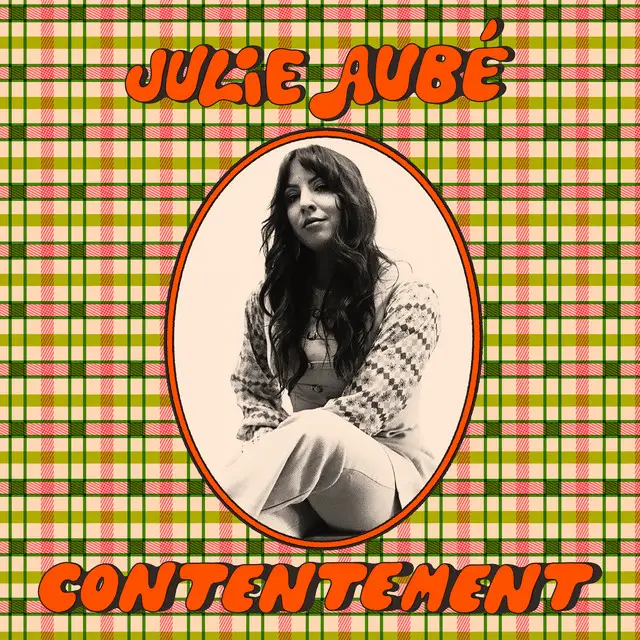
There is one English song on the album, “Sad Stranger,” which is also one of the ones that I found instantly very Bob Dylan in style. Why had you decided to have this one song in English?
Julie Aubé: It’s hard to say. Sometimes ideas just come out in English and sometimes what is magical about it is if I translate it then it loses its charm to me. It doesn’t have the same feeling. I wrote that about a guy I had met. There is this little fine arts university town near where I live and I go there there for coffee and to visit the bars. There’s all these cool artsy kids that live there and it’s also a place where people who have graduated from the university don’t move away and they just stay there and don’t make art so they are just getting old and awkward and they live at the bar. There’s the younger students who come but they just keep getting older and never end up using their degree.
Hahaha that’s a really funny image.
In 2017 you released Joie de vivre, your other solo album. Contentement feels a lot more catchier, maybe a little more playful. What has changed musically for you over the years? Has your approach to songwriting altered at all? Although you said that the pandemic had effected the theme of the songs!
Julie Aubé: Yeah a lot of things happened. At that time I was really into Black Sabbath and Thin Lizzy and I wanted to be like “NOT ENOUGH WOMEN MAKE PSYCHEDELIC HEAVY MUSIC.” I still love that but I made that album and then what happened is I would do shows and I’d be like “wait a minute, doing this live isn’t that much fun. It’s slow and heavy.” I like moving and dancing on stage and being wacky and this music didn’t fit. So when we did Contentement, especially with everything feeling heavy at the time emotionally, I told my whole band that I want every song to be fun. Even if they’re sad, I want it to be upbeat and fast. It was a consciously different approach and I was really inspired by Bob Dylan’s Rolling Thunder Review. I don’t know if you’ve ever seen it. It’s kind of carnivalesque and they all have face paints and wacky outfits.
Ahh yeah!
Julie Aubé: The way they’re playing the songs is fast and kind of crazy and right now im feeling that that’s my kind of show that I want to put on, like something people would dance and party to. I just want it to be fun.
Could you talk about the other people you worked with when making this album. Did they have approaches that influenced your vision?
Julie Aubé: I think a huge part of the album is the producer, Mike Trask. He’s a great producer in Acadie, who’s done a lot of albums. He has also a very strong whacky personality which is good for me, like nothing is too crazy and it doesn’t matter if the radio stations will play it or not. So I think he was a good person for me to feed off of. Sometimes I would show him a song I had written and I felt like it was too folky and I wasn’t sure how to make it more fun. He would find a way to rearrange the timing of it and the chord structure and make a whackier version of the song I wrote.
Ohh that's great. Another thing I’d love to mention:You make your own clothes, which is awesome, and these are also very retro in design. I think you’ve made outfits for Les Hay Babies as well that you’ve worn on stage. Do these play a part in your identity as an artist? For example, I love to knit and crochet things to wear. I’m not amazing but for me if the things we wear are a representation of ourselves then wearing something you’ve made with your own hands and imagination is like a true representation.
Julie Aubé: Everything you are saying is like the ultimate self expression. For me fashion and getting dressed always was a part of that. Even at school when I was younger, I always dressed very weird because I needed to. I think now, because I like vintage things, it’s hard to find. It’s not like I can just go to the store and be like “oh I want a green dress from the ‘60s” so sometimes I will get an idea for something and if I try really hard I can maybe make it happen if I find fabrics and patterns. It’s been so frilling to have a vision and make it happen.
I made an outfit for the album release. I don’t know if you’ve heard of the term ‘nudie suits’ before. They’re western suits from the ‘50s, kind of like Elvis but country stars would have had them with rhinestones and gems or embroidered horse shoes and roses on their jackets. I wanted to make a folkier version of that for my album release so I made all these resin buttons of wild flowers and bugs that I found and I put them all over my suit. There’s like all these gems on my suit but they are all these wild flowers that I found. I kind of ran out of place on the suit because I would have put more stuff but I wanted it to represent contentement. A lot of this album is also inspired by my grandmother, I spent a lot of time with her, and she’s a really simple lady. She likes black tea, knitting and gardening and I wanted to put stuff on the suit that made me think of her. All the wild flowers and stuff represent to me what contentement is.
That’s super sweet! I love when people make or customize their own clothes because it really brings out their personality and makes the item more human.
Julie Aubé: Definitely. There’s a whole reason behind it, it’s not just aesthetics. There’s a whole concept for sure.
You and Katrine from Les Hay Babies had opened a little vintage boutique in Moncton. Does this shop still exist?
Julie Aubé: No the physical shop no longer exists. We still have an Instagram and sometimes we’ll do drops of clothes on the Instagram when we have time or pop up shops at festivals or something like that. It’s hard to find the time to give it the right amount of attention.
Yeah I can imagine. How did you source the items which you sold in the shop? Were they all things you had picked up locally or around the world? How did that work?
Julie Aubé: Both. Sometimes we will be on tour and I’ll be at a street market and they’ll be racks of clothes for 2 dollars and I’ll find a really cool blouse or whatever. Sometimes it would be people who call us and would be like “ohh im cleaning out my aunt’s house and she has vintage clothes that she used to wear. Do you to see them? Do you want to buy them”? So sometimes it was just people bringing stuff, sometime it was people our own age who it didn’t fit anymore and sometimes it was at second hand stores finding something really crazy from the ‘60s.
That’s cool. I wondered if the action of curating and bringing together these items relates to music in the sense that perhaps songwriting is like strategically bringing together different influences.
Julie Aubé: I never thought of it but now that you say it you could find a correlation. For me when im writing I always try to write in my specific French Acadian dialect. I don’t have to do that. A lot of French artists just write in a standard French and even sing with a standard French accent and you can never tell where they’re from but I choose not to do that. It’s like if I’m curating a store I want everything to have a certain look and color scheme or year. When it comes to music I want it to be, for me personally, really representative of where I’m from and my heritage and all that so I make sure I use the specific words and pronunciations so that it does set me apart from other people.
Yeah your accent and dialect comes through. You said before that you take your influences from the ‘60s and ‘70s and want to recreate that with your Acadian personality but are there any local artists that have inspired you?
Julie Aubé: I find there are more and more Acadian artists that I love and listen to and go and see their shows and I think that inspires me to have done a solo album. Just the fact that there are more Acadian musicians out there doing their own thing. Like P’tit Belliveau, for example.
Yesss he’s awesome.
Julie Aubé: Yeah he’s so cool and his character, online presence and merch is so funny. There’s also Lisa LeBlanc, Menoncle Jason, these are all people that I admire so much and they inspire me to do the same, to think about who I am and what I want to present and project.
Are there any from past eras as well?
Julie Aubé: Ah yeah for sure. I really love Pascal Lejeune or I guess his artist name now is Thomé Young. And I really love Édith Butler, I think she’s incredible. And 1755 and also Zachary Richard From Louisiana. There are a lot of Cajun French artists from the ‘70s and ‘60s that I listen to all the time.
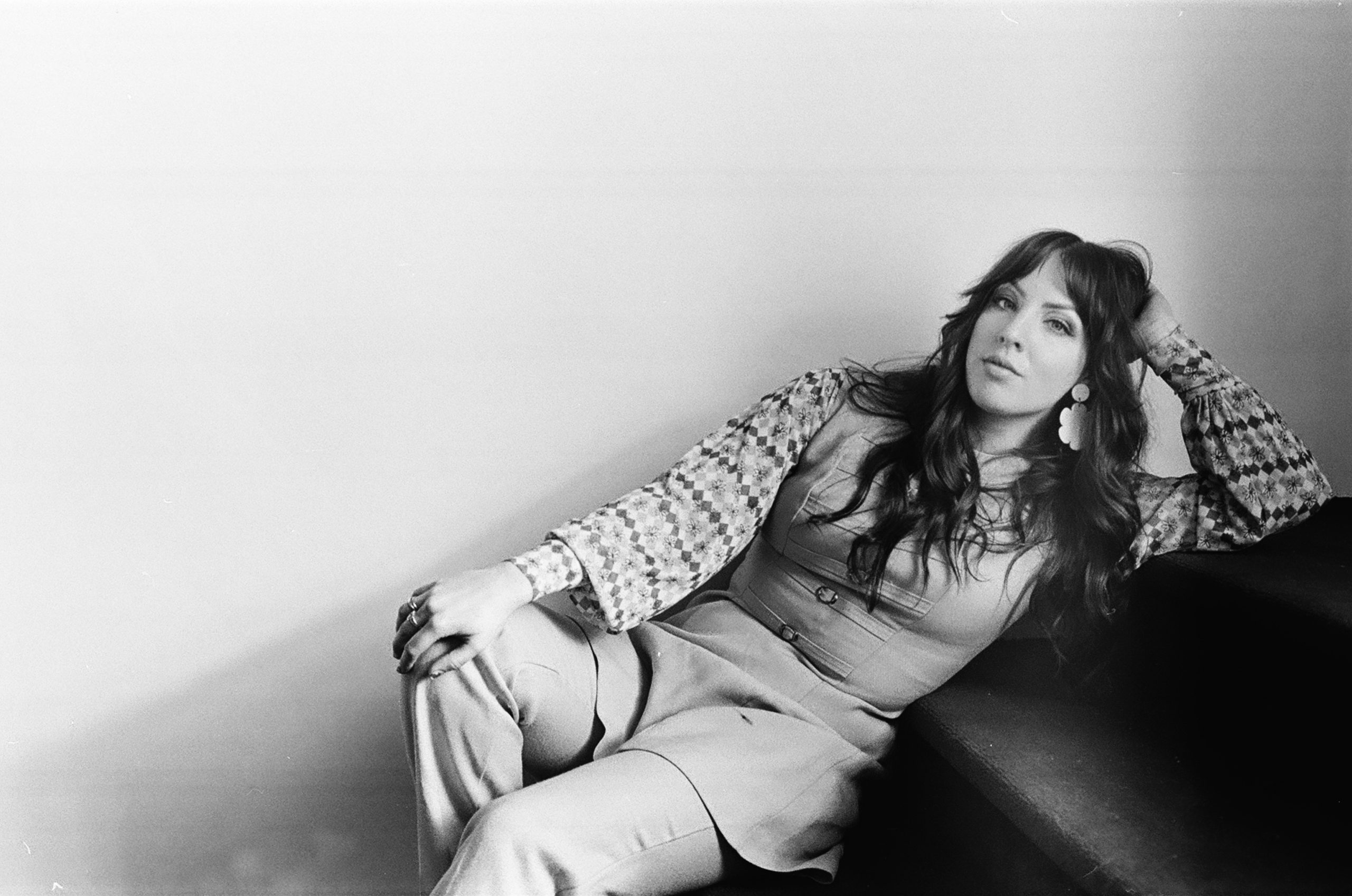
For your music, what do you hope people can take away from Contentement, whether they understand the lyrics or not?
Julie Aubé: I think any audiophile would get something out of it. It’s recorded on an analogue tape machine, it hasn’t even been touched by a computer, which is such a crazy process that not a lot of people go through. People ask me why I do it and it’s similar to why we like film cameras and telephones. It’s kind of like a medium of art. I like recording on analog tape machines because you can’t just magically fix every problem. Once you record it, it’s on there. I think if you are into the ‘60s or ‘70s at all you are going to see that the album is for you!
Yeah it’s very accessible, I believe. Is the analog recording something you have used in the past as well or that you’ve only just started to experiment with?
Julie Aubé: Yeah I did it for the first album as well. In a way it’s kind of like making clothes for me. I could buy clothes for a fraction of the price at H&M but instead I take the long and hard way and I make it! So recording analog is kind of like the equivalent of that.
I love that. It’s like everything we’ve talked about has all come together and we can now see that this album is a true representation of you! Do you have any more shows coming up or things with Les Hay Babies in the near future?
Julie Aubé: I wish I had more concrete details. I’m just currently taking a break because I did the album release and then I went to the UK right away so I have a little bit off time off but later this year I will be doing more shows for my solo project.
— —
:: stream/purchase Contentement here ::
Stream: ‘Contentement’ – Julie Aubé
— — — —

Connect to Julie Aubé on
Facebook, Instagram
Discover new music on Atwood Magazine
? © JD Cool
:: Stream Julie Aubé ::

